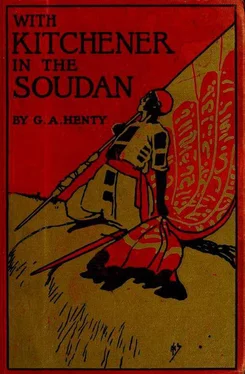By ten in the morning the army had arrived at its camping - place, which was in the southern part of the ground occupied by the straggling village. As usual, both extremities of the line rested on the Nile, forming a semicircle, in which the baggage animals and stores were placed, in charge of Collinson's brigade. The gun-boats took up their position to cover the ground over which an enemy must approach to the attack. While the infantry were settling down, the cavalry and camel corps went out scouting. Signallers soon mounted a rugged hill named Surgham, and from here a fine view was obtained of Omdurman and the Khalifa's army. Omdurman was six miles away, covering a wide tract of ground, with but few buildings rising above the general level, the one conspicuous object being the great tomb of the Mahdi with its white dome. In the outskirts of the town were the white tents of the Dervish army. For the present these were unoccupied, the whole force being drawn up in regular line out on the plain, about half-way between the town and Surgham Hill.
It was formed in five divisions, each of which was bright with banners of all colours, sizes, and shapes. The Khalifa's own division was in the centre, where his great black banner, waving from a lofty flagstaff, could be plainly made out.
The Lancers, Egyptian cavalry, and camel corps continued to advance, capturing several parties of footmen, principally Jaalins, who probably lagged purposely behind the retiring Dervishes in order to be taken. At times the cavalry attempted to charge the Dervish horsemen when these approached, but in no case did the latter await the attack. Presently, above the occasional musketry fire came the boom of a heavy gun. There was a thrill of excitement in the camp. The gun-boats had arrived opposite Omdurman and had opened fire upon the Dervish river-side forts. These Avere strongly constructed, but, as in the forts at Metemmeh and Shabluka, the embrasures were so faultily constructed that the guns could only be brought to bear upon the portion of the river directly facing them, and the four gun-boats passed them without receiving any material damage, and were so able to maintain the bombardment without receiving any fire in return. At the same time they landed the forty-pounder guns on an island but a short distance from the town, and thence opened fire with lyddite shells upon it. The howitzers were trained upon the Mahdi's tomb and soon great holes were knocked in the dome.
It could be seen from the top of the hill that this caused great excitement in the Dervish lines, and a number of their horsemen rode out against the Lancers and drove in their advance scouts; but on the main body of the regiment moving forward they fell back to their line, and almost immediately a heavy body of infantry moved out, their intention evidently being to surround and cut off the regiment, while at the same time a general advance took place. The Colonel of the Lancers dismounted a portion of his men, and these checked the advance of the enemy until the rest fell back.
The news of the advance was signalled to General Kitchener, and the whole force at once took their position in fighting order. Believing that a general attack on the camp would now be made, the cavalry fell back on either flank, so as to clear the Avay for the fire of the artillery and infantry. The Dervishes had a good view of our camp from the top of Surgham, but the Khalifa apparently considered that it was
too late in the day for a general attack, and drew off his men to their former position, and the rest of the afternoon and evening passed quietly.
As the men ate their meal of tinned meat and biscuit they were in higher spirits than they had been since the advance began. Hitherto they had been in constant apprehension lest the Dervishes should shun a battle, and would retire across the desert to El Obeid or elsewhere, and that they would have to perform interminable desert marches, only to find, on arriving at the goal, that the enemy had again moved off. The events of the day, however, seemed to show that this fear was groundless, and that the Khalifa had determined to fight a decisive battle for the defence of his capital, The British soldier is ready to support any fatigue and any hardship with a prospect of a fight at the end, and during the advance he is always haunted by the fear that the enemy will retire or give in on his approach. This fear was stronger than usual on this expedition, for there was no question as to the greatly superior mobility of the Dervishes, and it was evident that if they chose to avoid fighting they had it in their power to do so.
CHAPTER XIV
OMDURMAN
THE night passed quietly, except that shots were occasionally fired by Dervishes who crept up within range, and that once a mounted man, who had apparently lost his way, rode fearlessly into camp, and then, finding himself close to the troops, turned his horse and galloped off again. No shot followed him, as the orders were strict that the camp was not to be alarmed unless in the case of a serious attack.
At half-past three the bugle sounded, and the troops were soon astir. The animals were watered and fed, and the men had a breakfast of cocoa or tea, with biscuits and tinned meat. At half-past four Colonel Broad wood, commanding the Egyptian cavalry, sent out a squadron to the hills on the west, and another to Surgham Hill. The latter arrived at their destination at two minutes past five, when daylight had just broken. The officer in command saw at once that the Dervish army had been reinforced in the night, and were marching to attack us.
News was at once sent back to the camp, where all was in readiness for an advance. No news could have been more welcome. It was one thing to attack the Dervishes in their chosen position, and to carry the narrow streets of Omdurman at the point of the bayonet—the Dervishes had shown at Abu Hamed how desperately they could fight under such circumstances — and another to meet them while attacking our position in the open. This was protected along the line occupied by the white troops by a hedge, while the three Egyptian brigades had constructed shelter trenches. These afforded a vastly better defence against a foe advancing by daylight, although they would not be so effective in checking a sudden and determined rush* in the darkness.
Preparations were at once made to oppose the enemy. The Sirdar and his staff were already mounting when the news arrived; the horses were now taken to the rear, the reserve ammunition-boxes lifted from the mules' backs and the animals led to a sheltered jDosition behind some huts.
The guns were wheeled up into positions between the infantry brigades. The troops were disposed in line two deep, two companies of each battalion, with the stretchers and bearers, taking post at a short distance farther back to reinforce the front line if hardly pressed, and to supply it from the reserve store of ammunition. Already the gun-boats had recommenced the bombardment of Omdurman and the mosque of the Mahdi, but as soon as news came that the Dervishes were advancing to the attack, they were signalled to return to cover the flank of the zareba. On their arrival they took up a position whence they could shell the line by which the Dervishes were advancing, and which would bring them apparently five or six hundred yards west of Surgham Hill. The Lancers at once started forward to cover the left flank of the position. In a few minutes they reached Surgham Hill and joined the Egyptian squadron there.
The sight from the crest of Surgham Hill was grand. The enemy's front extended over three miles. The lines were deep and compact, and the banners floated above them. They were advancing steadily and in good order, and their battle-cries rose and fell in measured cadence. Their numbers were variously estimated at from fifty to seventy thousand—a superb force, consisting of men as brave as any in the world, and animated by religious fanaticism and an intense hatred of those they were marching to assail. In the centre were the Khalifa's own corps, twenty thousand strong. On their right was the banner of Yacoub, his brother, and beyond, two divisions led by well-known emirs, while on his left was the division led by his son, Osman, known as Sheik Ed Din, the nominal commander-in-chief of the whole force.
Читать дальше












